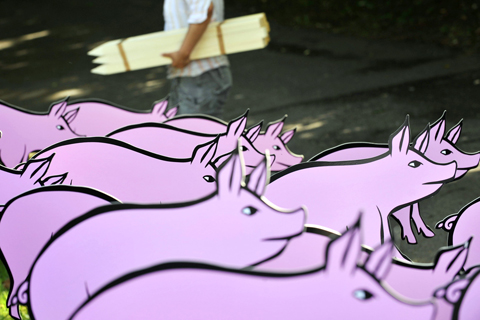The global swine flu death toll passed 100 on Wednesday with one new fatality reported in the US and four more in Mexico, the two countries where the first outbreaks were reported.
Prior to the latest North American deaths, the WHO had reported the global toll at 95, with 13,398 people in 48 countries infected with the A(H1N1) virus since it was first uncovered last month.
In Chicago, a second swine flu death was reported by officials, bringing the US toll to 15.

PHOTO: AFP
Mexico’s four fatalities raised the country’s toll to 89 with 100 new infections reported, bringing the total to 4,821, the health ministry said.
Around the world, efforts to control the disease continued as new cases were discovered.
Two more countries — the Dominican Republic in the Caribbean and South America’s Uruguay — each reported their first two confirmed cases of swine flu, raising the number of countries with cases to 50.
Chile confirmed 119 cases late on Tuesday, making it by far the South American country most affected by the outbreak. Argentina, Brazil, Colombia and Ecuador have also reported cases.
In Canada, the number of people infected with swine flu soared past the 1,000 mark with 197 new cases confirmed on Wednesday, health officials said.
Canada now has 1,118 total A(H1N1) cases, including two deaths. The country has the largest number of infections after Mexico and the US.
Elsewhere, services continued to slowly return to something approaching normal.
In Mexico, cruise ships began calling at Cozumel after a one-month hiatus.
Australia, meanwhile, slapped tough measures on cruise ships docking in Sydney in a bid to stop the spread of the disease.
Under the new rules, all cruise liners docking in Sydney will be treated as potential swine flu sites and passengers will be held on board until the ship is cleared.
Australia’s restrictions came with the A(H1N1) virus spreading further throughout Asia.
But the WHO has so far resisted declaring the disease a full-fledged pandemic.
The outbreak has spread further in Asia, with Singapore confirming its first case and Hong Kong, where Asia’s first infection sparked a week-long quarantine of about 300 guests and staff at a city hotel, announced a fresh total of 10.
Japan has seen a rapid rise in confirmed cases, saying Wednesday it had over 350.
In Europe, Romania announced its first confirmed infection in a woman who returned from New York on May 23 with her two young children. Greece reported its third swine flu case as health officials called a fresh emergency meeting, while stressing the situation was under “complete control.”

Seven people sustained mostly minor injuries in an airplane fire in South Korea, authorities said yesterday, with local media suggesting the blaze might have been caused by a portable battery stored in the overhead bin. The Air Busan plane, an Airbus A321, was set to fly to Hong Kong from Gimhae International Airport in southeastern Busan, but caught fire in the rear section on Tuesday night, the South Korean Ministry of Land, Infrastructure and Transport said. A total of 169 passengers and seven flight attendants and staff were evacuated down inflatable slides, it said. Authorities initially reported three injuries, but revised the number

‘BALD-FACED LIE’: The woman is accused of administering non-prescribed drugs to the one-year-old and filmed the toddler’s distress to solicit donations online A social media influencer accused of filming the torture of her baby to gain money allegedly manufactured symptoms causing the toddler to have brain surgery, a magistrate has heard. The 34-year-old Queensland woman is charged with torturing an infant and posting videos of the little girl online to build a social media following and solicit donations. A decision on her bail application in a Brisbane court was yesterday postponed after the magistrate opted to take more time before making a decision in an effort “not to be overwhelmed” by the nature of allegations “so offensive to right-thinking people.” The Sunshine Coast woman —

BORDER SERVICES: With the US-funded International Rescue Committee telling clinics to shut by tomorrow, Burmese refugees face sudden discharge from Thai hospitals Healthcare centers serving tens of thousands of refugees on the Thai-Myanmar border have been ordered shut after US President Donald Trump froze most foreign aid last week, forcing Thai officials to transport the sickest patients to other facilities. The International Rescue Committee (IRC), which funds the clinics with US support, told the facilities to shut by tomorrow, a local official and two camp committee members said. The IRC did not respond to a request for comment. Trump last week paused development assistance from the US Agency for International Development for 90 days to assess compatibility with his “America First” policy. The freeze has thrown
TESTING BAN: Satellite photos show a facility in the Chinese city of Mianyang that could aid nuclear weapons design and power generation, a US researcher said China appears to be building a large laser-ignited fusion research center in the southwestern city of Mianyang, experts at two analytical organizations said, a development that could aid nuclear weapons design and work exploring power generation. Satellite photos show four outlying “arms” that would house laser bays, and a central experiment bay that would hold a target chamber containing hydrogen isotopes the powerful lasers would fuse together, producing energy, said Decker Eveleth, a researcher at US-based independent research organization CNA Corp. It is a similar layout to the US$3.5 billion US National Ignition Facility (NIF) in northern California, which in 2022 generated